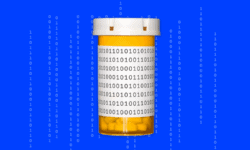The state of healthcare delivery is ripe for artificial intelligence (AI)-based solutions as shortages of healthcare workers and time-consuming laborious tasks pose challenges in resource allocation. AI adoption is rapidly transforming the healthcare environment, surfacing both opportunities and challenges for AI-driven efficiencies.
AlphaSense, a leading market intelligence platform, can help market researchers conduct fast-paced healthcare investment research and stay ahead of emerging trends such as AI adoption, leaving more time for strategic decision-making.
In this blog, we explore how AI is being used to improve the delivery of healthcare to patients, with a specific focus on two leading areas: diagnosing health conditions and streamlining administrative tasks. We’ll examine these topics by leveraging the AlphaSense research platform, including first-person insights from our expert transcript library.
Increasing Rates of AI Adoption in Healthcare Delivery
With an aging population, ongoing shortages of healthcare workers, and escalating healthcare costs, it’s a ripe time for AI solutions in healthcare delivery.
The U.S. population is projected to grow by 8.4% by 2036, with those aged 65 and older growing by 34.1% and those over 75 growing by 54.7%.

Additionally, over one-third of U.S. active physicians will likely retire within the next decade, and one-half of practicing physicians reported burnout in 2023. Meanwhile, the number of new registered nurses entering the workforce from 2022 to 2032 is projected to be less than one-tenth of the number needed to fill openings.
The average national health expenditure (NHE) in the U.S. is expected to grow at a rate exceeding the gross domestic product (GDP) through 2031.

According to one study, using AI to address these and other challenges could save the U.S. healthcare industry up to $360 billion annually. This would translate into a 10% reduction in current spending, while also offering non-financial benefits such as better healthcare quality, increased access to care, and higher satisfaction for patients and clinicians.
Related Reading: How Leading Healthcare Companies Are Using AI to Get Ahead
AI Adoption in Diagnostics
AI’s ability to analyze large amounts of data and identify patterns and anomalies within that data lends itself well to medical diagnostics.
AI Solutions in Imaging
AI applications have been mainly focused on diagnostic imaging that helps radiologists analyze medical X-rays, magnetic resonance images (MRIs), and computed tomography (CT) scans. In fact, as of July 2023, more than 75% of AI-enabled medical devices approved by the Food and Drug Administration (FDA) were used for radiology applications.

Likewise, AI is now being used to help cardiologists analyze echocardiograms (EKGs), with cardiology applications representing 9% of AI-based medical devices.
“We are going in this direction no matter what. It’s a very, very important area of implementing artificial intelligence in medicine, [the] field of cardiology and specifically imaging… I’m actually very excited.”
– Cardiologist | Expert Transcript
Experts say these AI imaging applications can help relieve bottlenecks at healthcare institutions.
“AI is absolutely crucial for the imaging product…The amount of diagnostic exams is increasing every day, whereas the number of radiologists having the capacity, the time to look at all the exam images is limited.”
– Former Director, GE Healthcare | Expert Transcript
AI excels at pattern recognition, but experts say it cannot yet replicate human reasoning and judgment. Consequently, AI is being used to support physicians who read images, not replace them.
“These image platforms, they use their algorithms, they use their machine learning to find specific nuances in the images that maybe a human wouldn’t have been able to pick up. It’s really like a teamwork process. I think that the radiologist and [AI] software together can find the best clinical picture.”
– Resident Physician | Expert Transcript
AI Solutions in Pathology
Meanwhile, AI-based diagnostic pathology applications are also making waves. These applications use AI to analyze digital slides made from tissue samples to help pathologists make more accurate diagnoses, especially for complex cancers.
“Pathologists have been banking cancer tumor samples, and they have been making judgments on those samples for decades. All that data is available [and with the help of] a good data scientist, now you can actually take your AI, and you can train it.”
– Former Director, Invitae | Expert Transcript
As with radiology, experts say AI can help ease bottlenecks in pathology departments.
“We’re doing [AI in pathology] now, and it’s going to grow in the future because there’s a continual lack of pathologists. Pathologists are even more understaffed than lab techs.”
– Health System Director of Laboratory Services | Expert Transcript
AI Support in Diagnostic Decisions
AI’s potential for providing physicians with diagnostic decision support is also generating enthusiasm, namely in the use of AI to analyze patient electronic health records (EHRs) and then suggest potential diagnoses.
“Let’s just say your patient today came here to say his chief complaint is some eye problem, but he also has diabetes. How do you make sense of this connection?… The predictive model, say, gives you the probability [of] about 90% this person has retinopathy complication due to the diabetes. [Now] you can be almost sure this person has this disease; of course, you still need a cross-check.”
– Assistant Vice President, Data Science, CitiusTech | Expert Transcript
AI Opportunities in Administrative Tasks
Let’s shift gears to the industry applications of AI that streamline administrative tasks in healthcare delivery.
Because the healthcare industry is complicated and highly regulated, it is riddled with outdated, manual, and time-consuming tasks. These tasks are considered a perfect fit for AI automation because they are often repetitive, rule-based, and data-driven.
“There’s a burnout epidemic in the U.S. for healthcare providers, doctors, nurses, respiratory care practitioners. A lot of this is the nature of our electronic health records (or EHRs) are relatively inefficient. They’re largely clerical systems that were developed to capture billing and transformed into recordkeeping and order entry… By and large, they’re poorly designed centerpieces of clinical care.”
– Neonatologist and Researcher in Digital Innovation | Expert Transcript
The following graphic outlines multiple opportunities for AI to streamline administrative tasks in the primary care setting while the hospital setting offers similar opportunities.

Below, we explore what experts have to say about implementing AI in healthcare practices to streamline administrative tasks and drive efficiencies.
One expert speaks on the use of AI in patient scheduling and registering:
“On the minds of most hospital executives is, ‘I cannot hire enough nurses to fill my floors. I cannot hire enough registrars to check in my patients. I can’t hire enough schedulers to answer the phone.’ If we’re really talking about burning [need] platform items, it’s how can we leverage automation and AI to A) totally replace the need to have humans in some of these roles, B) …improve the efficiency of these workers so that one scheduler can do the job of five?”
– Former Director, Olive AI | Expert Transcript
Another opportunity is the potential for AI to perform the initial patient screening and synthesize the patient’s information to save physicians time:
“The most rate-limiting step I would argue right now of a visit is listening to the patient. …It is horribly inefficient as they slowly tell their story, and they’re really not prepared to tell their story. I’d love to see some type of AI that listens to a patient prior to the visit and can synthesize and give us the bullet… I think there’s a huge opportunity there.”
– Healthcare System Chief Medical Officer | Expert Transcript
Experts also suggest that AI implementation can drive efficiencies in clinical documentation:
“If I round on 14 people, I can finish that work by 11:00 A.M., but I don’t leave the hospital for three hours because I’m just documenting. … There’s a ton of low-value redocumentation every day. It’s so crazy the amount of time that physicians spend cutting and pasting.”
– Internal Medicine Physician | Expert Transcript
Another opportunity for AI-driven efficiencies is the automation of test result delivery and patient follow-up:
“We get a lot of inbox results, and a lot of them are negative. STD screening or strep testing, …COVID testing, and we manually have to go into these inboxes and reply to every single one, that ‘Hey, your test is negative. Everything looks good.’ That’s one application where things can be streamlined [with AI].”
– Urgent Care Physician | Expert Transcript
Challenges of AI Adoption in Healthcare Delivery
AI-based solutions in healthcare delivery hold tremendous promise, but experts say they are still mainly in the early stages of development and adoption.
“We’re at AI 1.0 in the medical world, and we’re not really even crawling. The hype was suggesting we would be using AI left and right; it was going to revolutionize the job. I believe we’ll get there. I [just] don’t think it’s going to be in exactly the way that we thought… when we first envisioned these tools a couple of years ago.”
– Cancer Center Physician and Director of Artificial Intelligence | Expert Transcript
Limited Data Availability
Experts cited several hurdles to adoption, including limited patient data to feed AI algorithms. Patient privacy concerns have made healthcare systems reluctant to share patient data with AI developers. Complicating matters, there are relatively few EHR software vendors on the market, and all have proprietary systems, which raises questions about interoperability with AI applications.
“There are a number of problems. One is going to be making sure that the personal records – they’re private – will not be compromised. The other thing is, how is it going to be integrated into our electronic health record system?… Just because you have a new software and you want to apply it doesn’t mean that it will happen in hospital settings.”
– Cardiologist | Expert Transcript
Experts said healthcare systems’ desire to withhold data to extract value from it has also been a hindrance.
“Data was much more easily available to some of the early [AI] movers, but over time, hospital systems started recognizing the value of their data and pretty quickly clamped down, either requiring large payments or some sort of equity involvement, some arrangement for the intellectual property being generated… That resulted in a lot of the data now being much more difficult to access.”
– Cancer Center Physician and Director of Artificial Intelligence | Expert Transcript
Uncertain Return on Investment
Experts said that, faced with a limited amount of data, many AI-based applications have been unable to demonstrate a compelling investment case to hospital systems and insurance companies.
“I talk to a lot of different [AI] vendors, and they often ask, ‘What’s it going to take to make that sale?’ Unfortunately, it’s often hardcore ROI… It’s a little bit of a hard sale, but I think that’s the way it’s [going to be] for the next several years at least.”
– Healthcare System Chief Medical Officer | Expert Transcript
Compounding matters, the U.S. has few clear pathways for insurance reimbursement for AI-based medical equipment and diagnostic procedures, prompting vendors to cover their AI costs with price increases.
Patient Safety Concerns
In addition, experts said the bar for AI applications in healthcare is higher than in other industries because of the real or perceived risk to patients.
“[In] most industries… retail, manufacturing, even energy, a mistake in an [AI] use case could result in some lost revenue, some lost efficiency, maybe some additional rework from a human. When we’re talking about the healthcare world, a mistake in AI deployment could literally mean the difference in a patient’s life.”
– Former Director, Olive AI | Expert Transcript
Regulatory Direction Lacking
Experts said the lack of clear regulatory direction is also a hurdle, particularly for clinical applications.
“It’s challenging… The regulatory framework isn’t very well defined to give confidence that we should develop a model that predicts or recommends chemotherapy for a cancer patient or something like that. All of that… probably won’t be in play for the next one to three years.”
– Physician Involved with AI Research and Operations | Expert Transcript
Future Outlook of AI in Healthcare Delivery
Going forward, the pace at which AI will be developed and adopted in healthcare delivery is difficult to predict. However, experts agree that AI technology focused on administrative tasks will likely move faster than that focused on diagnostics and other clinical applications.
“Those [administrative] areas, there’s lower thresholds of risk. There’s also the ability to point to more concrete efficiencies… I can show you that ‘Aha, I found these patients that need their mammogram, and they were not picked up by the system,’ or ‘These patients have automatically been rescheduled at a place that’s closer to their home.’ For those reasons, I think we will see faster development of AI in [administrative] spaces.”
– Cancer Center Physician and Director of Artificial Intelligence | Expert Transcript
This expert was willing to offer time frames for AI adoption.
“I would say we’re probably five years away from most large systems using AI to supplement at least their administrative portions of their organization, and loosely 10 years off from most organizations thoroughly using AI as part of their actual clinical and treatment operations.”
– Former Director, Olive AI | Expert Transcript
Discover more expert perspectives on healthcare AI-driven efficiencies in our report, How Artificial Intelligence is Reshaping Drug Development.
The healthcare industry is rapidly evolving with the rise of AI adoption, along with its many challenges. As dynamics continue to unfold in AI-based healthcare, AlphaSense can help you monitor and surface developments with the help of powerful AI technology and first-person expert insights.
Evolve your healthcare market research today. Start your free trial with AlphaSense today.




